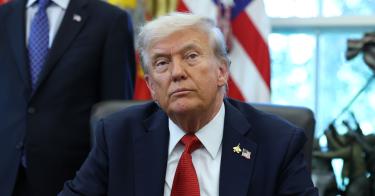Before his second term began, President Trump was prosecuted repeatedly in state court, federal court and the Senate. After it ends, he could face trial in another venue, the International Criminal Court in The Hague. The U.S. didn’t sign the Rome Statute and therefore doesn’t belong to the ICC, but the court can find a jurisdictional hook in actions the administration has taken abroad in ICC member states.
The strikes on Venezuelan narcoterror smuggling boats provide one possible avenue. Shortly after the U.S. Navy destroyed the first such vessel, Ken Roth, a former head of Human Rights Watch, endorsed ICC intervention. “Trump just did what the International Criminal Court has charged former Philippines Pres. Duterte with doing—ordering the summary execution of alleged drug traffickers,” Mr. Roth tweeted. Venezuela is a Rome Statute party, which in the court’s thinking gives it jurisdiction over U.S. officials and servicemen involved in the attacks. The ICC has already launched an investigation against a nonmember state (Israel) based on a single boarding of a vessel flagged by a member state, so it has all the precedents it needs.
Mr. Trump has thus far taken an incremental approach to the ICC. He revived a first-term executive order authorizing sanctions against the court and applied it against four ICC officials. None of this has significantly reduced the risk to the U.S. or led the ICC to change its ways.
>>> Investigate the International Criminal Court’s Prosecutor
The ICC’s supporters don’t see the existing sanctions as an “existential threat.” The tribunal can easily ride it out by lying low until a Democratic president lifts the sanctions, as Joe Biden did. The court takes a long view—its prosecutors and judges have nine-year terms, and its other staffers are part of a global deep state who can expect to remain at their jobs indefinitely.
International lawyers are already developing multiple lines of attack against the administration and its officials. The ICC’s prosecutor has threatened to bring charges over Mr. Trump’s sanctions.
Immigration policy is another potential target. An article published on a leading international-law website argues that Mr. Trump’s deportations “rise to the level of a crime against humanity,” a category over which the ICC has jurisdiction. Moreover, many destination states—such as El Salvador, Guatemala and Mexico—are ICC members, making the court’s jurisdiction straightforward. El Salvador’s CECOT gang prison is already a popular target for international lawyers’ ICC fantasies, now with the added benefit that it would also sweep in deportations by Mr. Trump.
Another potential target is Mr. Trump’s proposal to allow Gazans to escape their blighted territory. A former ICC judge has already called it illegal. Another commentator wrote that “the White House’s ‘plan’ almost begs the ICC to investigate American conduct in Gaza.” Never mind that the plan would actually realize Gazans’ human rights and hasn’t been implemented. Under the new definitions of crimes recently created against Israel, that is not an obstacle.
This isn’t to say marshals from The Hague will face off with the Secret Service. Rather, the court would wait for a favorable administration in Washington and then open an investigation into Trump policies. This itself would have a chilling effect on foreign travel by Mr. Trump and his former senior officials. The court could then use secret sealed warrants to try to ambush former officials, like Marco Rubio or Pete Hegseth, on travels to Paris, London or Tokyo.
>>> International Law Is No Bar to Trump’s Gaza Proposal
A President Gavin Newsom would likely issue diplomatic objections but nothing more. It is unlikely the court would try to arrest Mr. Trump himself. As with Prime Minister Benjamin Netanyahu, the goal would be to harass him and cast a shadow on his legacy, delegitimizing the people and ideas behind MAGA.
The Duterte case mentioned by Mr. Roth is a cautionary tale for Mr. Trump. Rodrigo Duterte was a democratically elected president who waged a public, and successful, campaign to wipe out his country’s violent drug gangs. Although this bears no similarity to the atrocity crimes the ICC was created to deal with, the court charged him with crimes against humanity. He brushed off the charges and had Manila quit the court. But a few months ago his successor conspired with The Hague to arrest Mr. Duterte, taking a political rival out of play.
Mr. Trump can still avoid this while implementing his policies, but he needs a much more aggressive approach to the ICC. The administration should demand that regional allies like El Salvador and Guatemala quit the court, joining pro-American countries like Hungary, which recently became the first European Union member state to do so. The president should also expand sanctions to target the entire institution and all its employees, whether they work in the office of the prosecutor or the IT desk. The administration is reportedly considering such measures.
Mr. Trump’s adversaries caught him by surprise with their lawfare campaign during and after his first term. With the ICC, he has a chance to strike pre-emptively.
This piece originally appeared in the Wall Street Journal on October 5th, 2025




